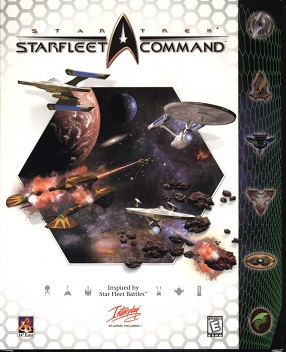
Half-Life is a 1998 first-person shooter (FPS) game developed by Valve Corporation and published by Sierra Studios for Windows. It was Valve's debut product and the first game in the Half-Life series. The player assumes the role of Gordon Freeman, a scientist who must escape the Black Mesa Research Facility after it is invaded by aliens following a disastrous scientific experiment. The gameplay consists of combat, exploration and puzzles.

Carmageddon is a vehicular combat video game released for personal computers in 1997. It was produced by Stainless Games and published by Interplay Productions and Sales Curve Interactive. It was ported to other platforms, and spawned a series.

Star Trek: Starfleet Command is a computer game based on the table-top wargame Star Fleet Battles. It was developed by 14° East and Quicksilver Software and published by Interplay Entertainment. It was released in 1999 for Microsoft Windows. It simulates starship operations, ship-to-ship combat, and fleet warfare in the Star Trek universe. An expanded version was released in 2000 titled Star Trek: Starfleet Command - Gold Edition. It includes the latest patch and all the missions that were downloadable from the official website.

Darkstone: Evil Reigns is an action role-playing video game developed by Delphine Software International for Microsoft Windows and PlayStation. In 2014, the French publisher Anuman Interactive launched a remake available on iPad, iPhone and Android, with the cooperation of the original game's author Paul Cuisset.

Rome: Total War is a strategy video game developed by The Creative Assembly and originally published by Activision; its publishing rights have since passed to Sega. The game was released for Microsoft Windows in 2004. The macOS version was released on February 5, 2010, by Feral Interactive, who also released the iPad version on November 10, 2016, the iPhone version on August 23, 2018, and the Android version on December 19, 2018. The game is the third title in The Creative Assembly's Total War series, following Shogun: Total War, and Medieval: Total War.

Introversion Software Limited is a British video game developer based in Walton-on-Thames, England.

Darwinia is a 2005 real-time tactics and real-time strategy video game for Microsoft Windows, Mac OS X and Linux. It is the second game developed by Introversion Software, and is set within a computer environment that simulates artificial intelligence. It received favourable reviews and won three awards at the 2006 Independent Games Festival. A multiplayer sequel, Multiwinia, was released for Windows in 2008. Darwinia and Multiwinia were released together as Darwinia+ for the Xbox 360 in 2010.

Heroes of Might and Magic III: The Restoration of Erathia is a turn-based strategy game developed by Jon Van Caneghem through New World Computing originally released for Microsoft Windows by The 3DO Company in 1999. Its ports to several computer and console systems followed in 1999–2000. It is the third installment of the Heroes of Might and Magic series.

Homeworld is a real-time strategy video game developed by Relic Entertainment and published by Sierra Studios on September 28, 1999, for Microsoft Windows. Set in space, the science fiction game follows the Kushan exiles of the planet Kharak after their home planet is destroyed by the Taiidan Empire in retaliation for developing hyperspace jump technology. The survivors journey with their spacecraft-constructing mothership to reclaim their ancient homeworld of Hiigara from the Taiidan, encountering a variety of pirates, mercenaries, traders, and rebels along the way. In each of the game's levels, the player gathers resources, builds a fleet, and uses it to destroy enemy ships and accomplish mission objectives. The player's fleet carries over between levels, and can travel in a fully three-dimensional space within each level rather than being limited to a two-dimensional plane.

DEFCON is a real-time strategy game created by independent British game developer Introversion Software. The gameplay is a simulation of a global nuclear war, with the game's screen reminiscent of the "big boards" that visually represented thermonuclear war in films such as Dr. Strangelove, Fail-Safe, and especially WarGames.

Wing Commander is the first game in Chris Roberts' space flight simulation Wing Commander franchise by Origin Systems. The game was first released for MS-DOS on September 26, 1990 and was later ported to the Amiga, CD32 (256-color), Sega CD and the Super Nintendo Entertainment System, and re-released for the PC as Wing Commander I in 1994. An enhanced remake Super Wing Commander was made for the 3DO in 1994, and later ported to the Macintosh.

Bang! Gunship Elite is a space combat simulator developed by French studio RayLand was released for Windows and Dreamcast. It allows the player to fly a combat spacecraft in a fully 3D environment and fight enemies piloting similar craft to their own.

Elite Plus is a 1991 video game published by Microplay Software.
Linux-based operating systems can be used for playing video games. Because many games are not natively supported for the Linux kernel, various software has been made to run Windows games, such as Wine, Cedega, and Proton, and managers such as Lutris and PlayOnLinux. The Linux gaming community has a presence on the internet with users who attempt to run games that are not officially supported on Linux.

Crayon Physics Deluxe is a puzzle video game designed by Petri Purho and released on January 7, 2009. An early version, titled Crayon Physics, was released for Windows in June 2007. Deluxe won the grand prize at the Independent Games Festival in 2008. It features a heavy emphasis on two-dimensional physics simulations, including gravity, mass, kinetic energy and transfer of momentum. The game includes a level editor and enables its players to download and share custom content via an online service.

Slitherine Software UK Limited is a British video game developer and publisher founded on 25 June 2000. It is responsible for the production of a range of over 200 strategy and war video games. Slitherine developed and/or published a number of licensed games with brands including Battlestar Galactica, Warhammer 40,000, Starship Troopers, Horrible Histories and The History Channel. It also produces rules for a series of tabletop wargames called Field of Glory.
Humble Bundle, Inc. is a digital storefront for video games, which grew out of its original offering of Humble Bundles, collections of games sold at a price determined by the purchaser and with a portion of the price going towards charity and the rest split between the game developers. Humble Bundle continues to offer these limited-time bundles, but have expanded to include a greater and more persistent storefront. The Humble Bundle concept was initially run by Wolfire Games in 2010, but by its second bundle, the Humble Bundle company was spun out to manage the promotion, payments, and distribution of the bundles. In October 2017, the company was acquired by Ziff Davis through its IGN Entertainment subsidiary.

Prison Architect is a private prison construction and management simulation video game developed and published by Introversion Software. It was made available as a crowdfunded paid alpha pre-order on September 25, 2012 with updates that were scheduled every three to four weeks until 2023. With over 2,000,000 copies sold, Prison Architect made over US$10.7 million in pre-order sales for the alpha version. Prison Architect was an entrant in the 2012 Independent Games Festival. The game was available on Steam's Early Access program, and was officially released on October 6, 2015.
Besides the Linux distributions designed for general-purpose use on desktops and servers, distributions may be specialized for different purposes including computer architecture support, embedded systems, stability, security, localization to a specific region or language, targeting of specific user groups, support for real-time applications, or commitment to a given desktop environment. Furthermore, some distributions deliberately include only free software. As of 2015, over four hundred Linux distributions are actively developed, with about a dozen distributions being most popular for general-purpose use.

















